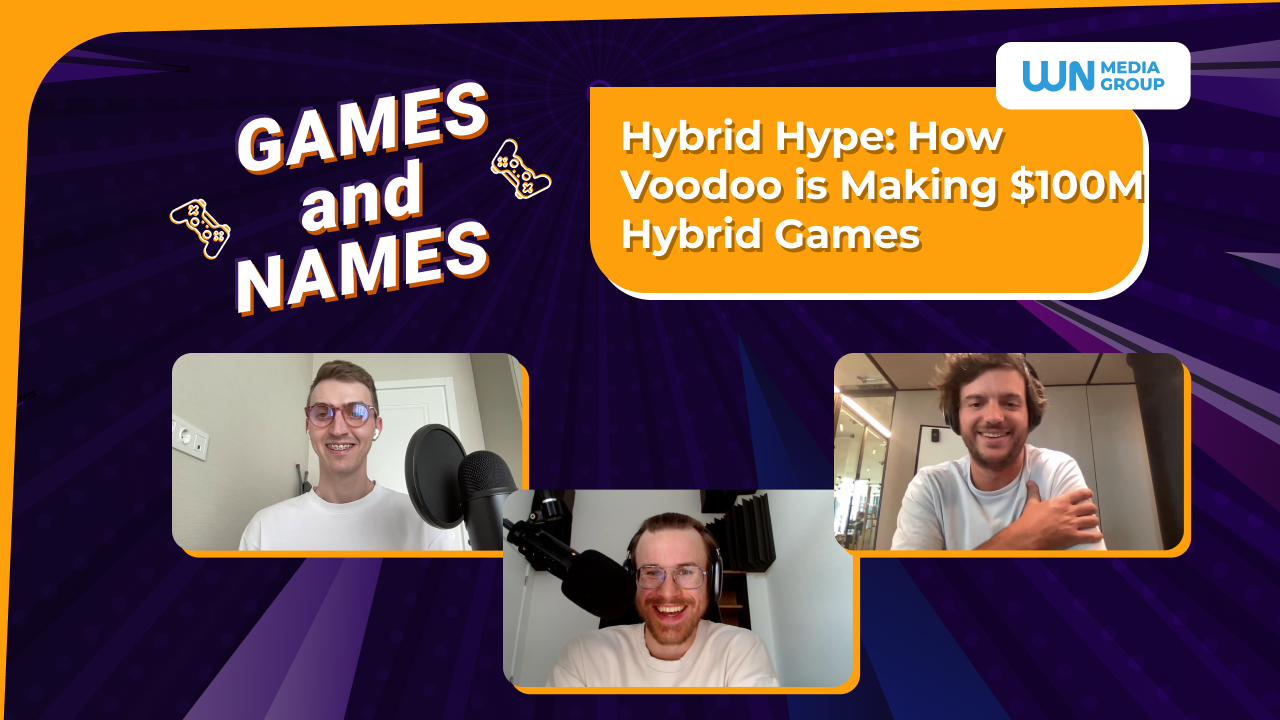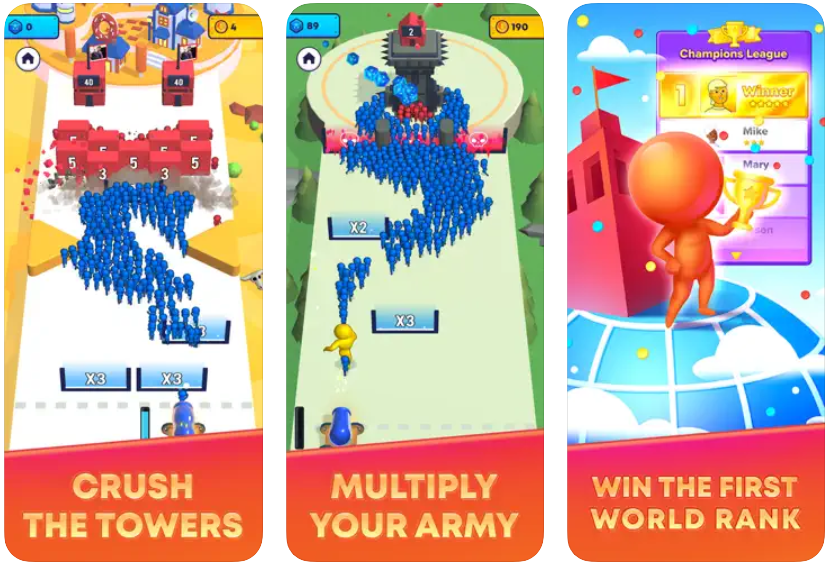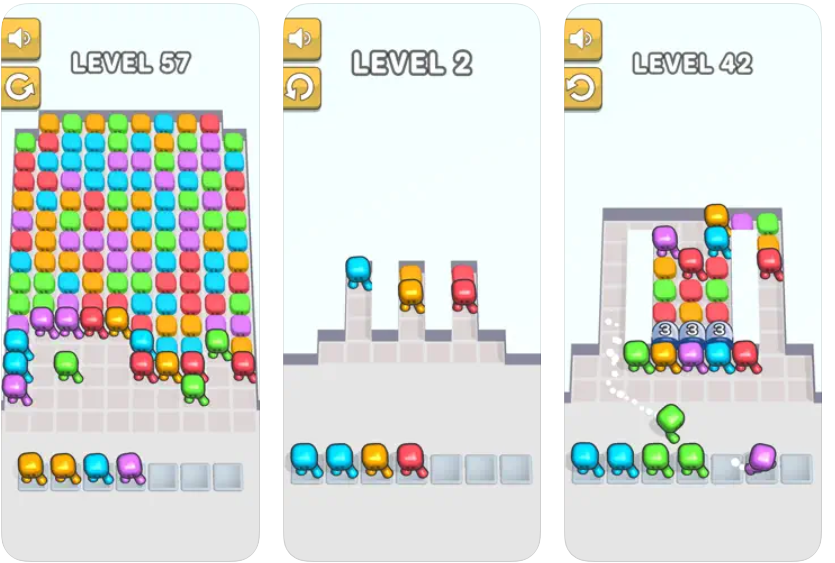What are hybrid-casual games and how are their monetization loos different from hyper-casual? Voodoo head of publishing Thibault de Vésinne-Larüe has opened up about the company’s approach and what metrics it looks at when launching new titles.

De Vésinne-Larüe was a special guest on the third episode of Games and Names, a games industry podcast launched by AppMagic in partnership with WN Media Group. Together with co-hosts, AppMagic VP of product Stan Minasov and business development manager Kirill Vaganov, he shared a lot of insights about the hybrid-casual segment of the mobile games market.
Below are the key takeaways from the conversation, but to get the big picture, listen to the third episode in full on:
What are hybrid-casual games?
According to de Vésinne-Larüe, hybrid-casual titles are defined by:
- Deep core gameplay (deeper than hyper-casual projects can offer);
- At least 15% D7 retention just through core gameplay alone;
- Combination of different monetization loops.
Hybird titles can incorporate elements from a wide variety of niches and genres, from Merge and Match-3 to Action and FPS. “It can be any kind of core gameplay that can get you high retention with a hybrid monetization,” de Vésinne-Larüe said.
Hyper-casual are usually monetized through ads and rewarded videos, but the hybrid model involves adding other methods such as in-app purchases (IAPs) to improve the lifetime value (LTV). The goal should be to “monetize everyone” from the get go, but also find ways to retain the core playerbase for as long as possible.
“The whole idea is to build games that become resilient through live ops, level design, and deeper meta gameplay, so you can actually keep scaling the game for years,” de Vésinne-Larüe explained.
Examples of successful hybrid-casual games in Voodoo’s portfolio are Mob Control, which has a hyper-casual core but with meta elements (multipliers, multiplayer, etc.), and Collect Em All!, which offers classic puzzle gameplay but with mini games and meta decorating options.
According to Voodoo, hybrid “mega hits” in its portfolio are generating between $20 million and $100 million in annual revenue.

Mob Control
The rise of the hybrid-casual segment
De Vésinne-Larüe noted that while the hybrid-casual category is getting more popular in the media and professional community, it is far from being the ultimate market leader. Casual giants like King and Supercell still dominate the industry in terms of revenues.
However, mobile publishers really started moving into the hybrid niche a few years ago because it was actually getting very difficult to launch a successful hyper-casual game. Speaking about the reasons, de Vésinne-Larüe cited Apple’s IDFA changes, which had a huge impact on user acquisition and increased the CPI (especially in the hyper-casual segment), while the LTV just didn’t catch up.
Voodoo started this transition back in 2020 when the company looked at metrics and realized that the situation was only going to get worse. So the rise of the hybrid-casual model, according to de Vésinne-Larüe, was driven by three things:
- It was a way for Voodoo and other hyper-casual publishers to find profitable new ways to launch products amid the decline of the segment they originally operated in;
- Also hurt by increased CPIs, casual publishers started thinking about how to monetize their titles beyond pure IAPs;
- The emergence of games like Project Makeover, which used hyper-casual gameplay as clickbait ads to get low CPIs and then added them as mini games to eventually engage players in the deeper core gameplay.

Collect Em All!
What is Voodoo’s process of making hybrid-casual games?
As explained by de Vésinne-Larüe, Voodoo games usually go through three main stages:
- Publishing divison works with core studios (both internal and external) to make prototypes;
- Once the company has a promising game with a hybrid monetization potential, it soft-launches it and starts scaling it;
- If a game has good metrics following the soft launch, it is assigned to a live team, which “lives” with it and keeps scaling it (live teams are comprised of people with experience in operating casual games).
“Our main strength lies in the fact that we make a lot of prototypes,” de Vésinne-Larüe said. “It is just a change of the kind of games that we’re going to make, but in the end it is the same process. We’re a bit more prescriptive than we were in the past. We give more guidelines because we have more convictions on where we should go and we need to help the studios to develop the strategy. They also have a lot of autonomy find ideas, concepts, and test new things.”
“But we still have the same process of reviewing ideas, testing fast, killing fast, iterating, sof-launching fast. We’re just adding luxury we have in the end, which are made of amazing leaders from the casual world that can actually work with games and get them to the next level.”
What metrics does Voodoo take into account when launching hybrid-casual games?
The company has two approaches to making hybrid titles:
- Taking its existing and already promising hyper-casual games and “hybridizing” them by adding new monetization loops and gameplay elements — e.g. Mob Control;
- Making completely new games by looking at casual/midcore games in the market that can be simplified and made more accessible to the wider audience, and adjusting their gameplay to the hybrid model — e.g. Block Jam 3D.

Block Jam 3D
Speaking about metrics that Voodoo considers good, de Vésinne-Larüe said the game should have at least 45% D1 retention, 15% D7 retention (20% for puzzle titles), and 10% D30 retention. It also looks at daily playtime to check users’ engagement and see how often they return to the game. CPI is also something the company takes into account with both new titles and existing projects it hybridizes.
De Vésinne-Larüe also noted that monetization methods that Voodoo applies to its hybrid games are based on their core gameplay. The company always looks at highest-grossing titles in each genre to see what strategies work best for top titles and how it can apply them to its own products.
